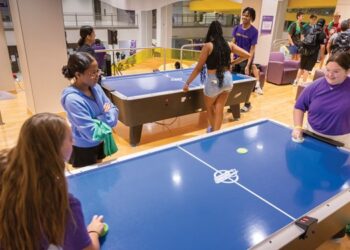Sports, by their very nature, can elicit emotional reactions in the athletes that play them, even at the intramural level. Because of this, it’s important to have student officials who are not only level-headed, but who also have a passion for upholding the main tenets of the profession.
“When we’re hiring, we look for students who have some experience in officiating,” said Cynthia P. Costanzo, the executive director of The University of Connecticut’s (UConn) recreation department. “But really more than that, we look for a student who might be interested in getting involved in this line of work.”
Costanzo explained interest is vital due to the nature of officiating sports, which puts students in a supervisory role over their peers. “That can be hard, especially if there’s a conflict, they make a bad call or have to make a hard decision,” she said. “But we feel [these positions] are really important in terms of some of the soft skills that students learn outside the classroom that can benefit them in the long-term.”
At Kansas State University (KSU), an interest in the officiating profession is a key component when hiring for the intramural season. In addition, the department looks for students who are team players and willing to learn.
“The eager, hard-working employees are the ones who pass on their contagious work ethic and enthusiasm to the younger classes of officials, and it creates a cycle of improvement for the whole program,” said Denise Simonds, an administrative specialist of recreational services at KSU.
Because UConn’s students are so passionate about their jobs, the school feels it’s important to invest in their education. New hires go through an extensive training process that educates them on the school’s officiating protocol, so that games are regulated equitably. Plus, UConn Recreation brings in professional officiants to provide additional instruction.
Because of this, Bhavin Parekh, the associate director of UConn Recreation, explained student officiants tend to leave with even further passion for the career. “The thing we’re learning over the past few years is a lot of the students who graduate from here are still continuing to officiate as an avocation, regardless of what their major was or what their full-time job ends up being, even if they don’t go into the recreation field,” he said.
In addition to entry-level officiating, KSU also hires for supervisory roles. When filling these positions, Simonds advised, “Remember that they will be put in situations where they will have to give bad news to their peers. Hire personable, responsible and empathetic people, and the rest should take care of itself.”
During the intramural hiring process, it’s also best to ensure students are fully aware what the position requires. “The hours are always going to be non-traditional, so our students typically will agree to work two evenings per week,” said Costanzo. “You need to be clear what the work is, what the hours are and what the expectations are. If you do that upfront, hiring and retaining employees is much easier.”










